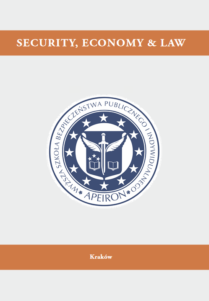SYSTEM DOZORU ELEKTRONICZNEGO W POLSCE – PRAKTYKA STOSOWANIA
ELECTRONIC SUPERVISION SYSTEM IN POLAND – PRACTICE OF APPLICATION
Author(s): Katarzyna DanielSubject(s): Politics, Criminal Law
Published by: Wyższa Szkoła Bezpieczeństwa Publicznego i Indywidualnego “Apeiron” w Krakowie
Keywords: electronic supervision; punishment; deprivation of liberty; prison; convicted
Summary/Abstract: Writing this article has been taken due to the problem of applying the pen- alty of imprisonment in the electronic supervision system in practice since the introduction of the Act on electronic surveillance (2007). In Poland the use of electronic surveillance system currently only uses about 30% of the total provided for serving a penalty in this way, the number of con- victs. Despite the functioning for 12 years, the still needs to be improved. The main two problems are the large number of rejected applications for the use of electronic supervision (including also discontinued proceedings) and the inferential nature of this system. To investigate the phenomenon, qualitative research methods and techniques (individual in-depth inter- views) and analysis of existing data (content analysis, desk research) were used. The author concludes that electronic supervision is a better form of imprisonment that serving her in a prison. The infrastructure is prepared for serving a penalty in the electronic supervision system by 15 thousand convicts, so the problem of not using the possibility of this solution lies on the side of penitentiary courts, which grant permission only to every third convicted person. Another important problem is the provisions of the Act (for example the nature of the application, not the public nature of the proceedings, or consideration of cases only by district courts). A conversation with a person who has twice used electronic supervision shows how positively it is perceived by convicts in comparison to a stay in a prison.
Journal: Security, Economy & Law
- Issue Year: 1/2019
- Issue No: XXII
- Page Range: 16-34
- Page Count: 19
- Language: Polish

